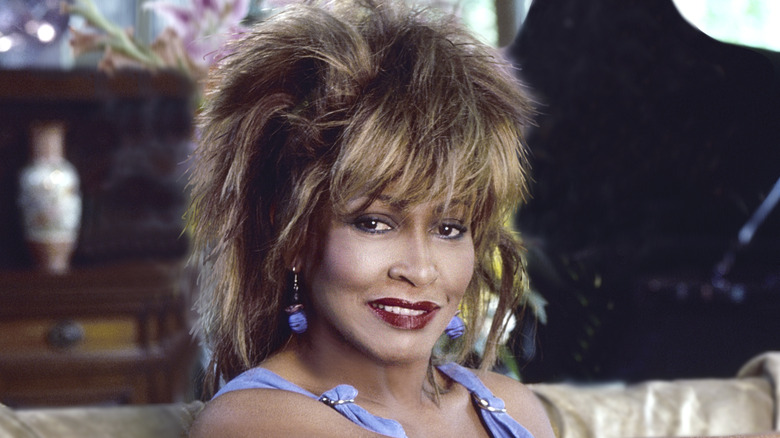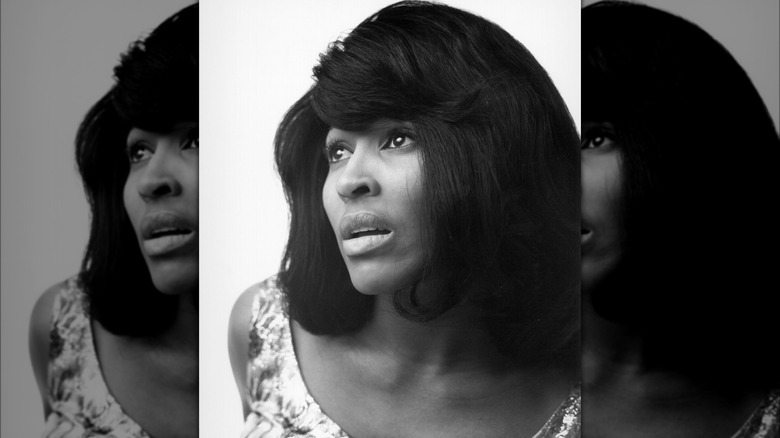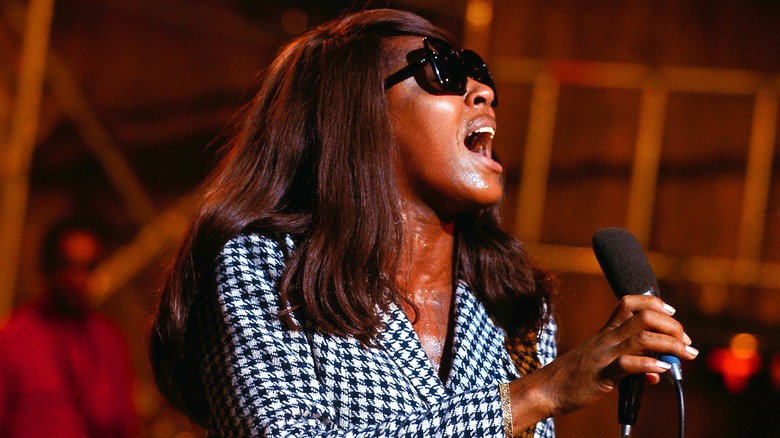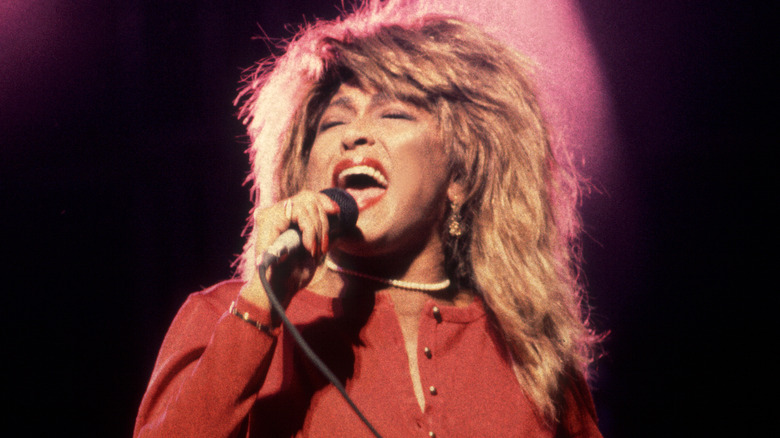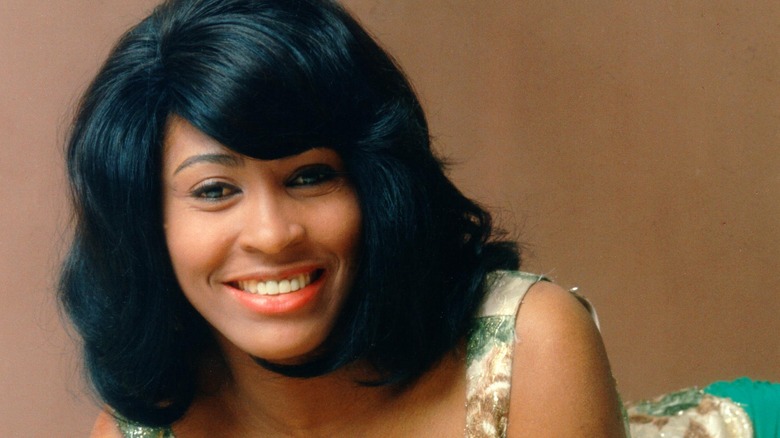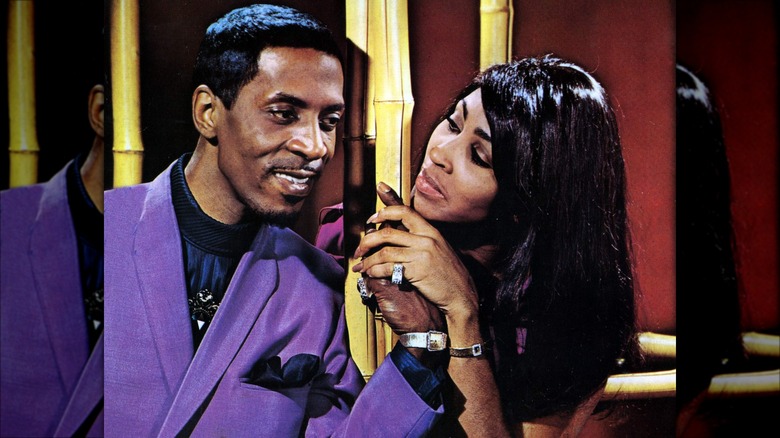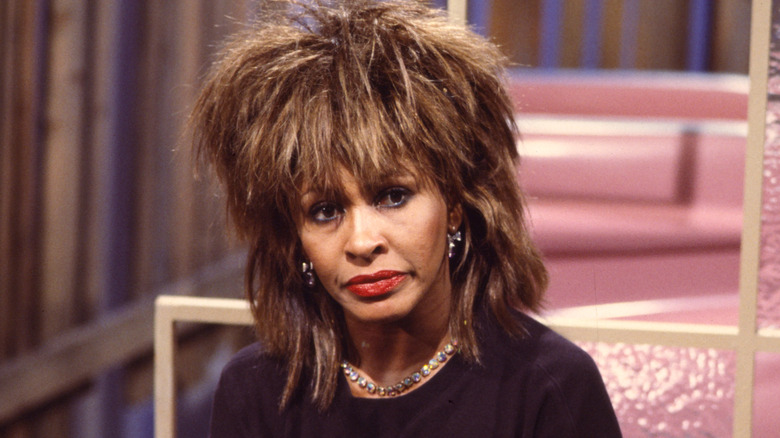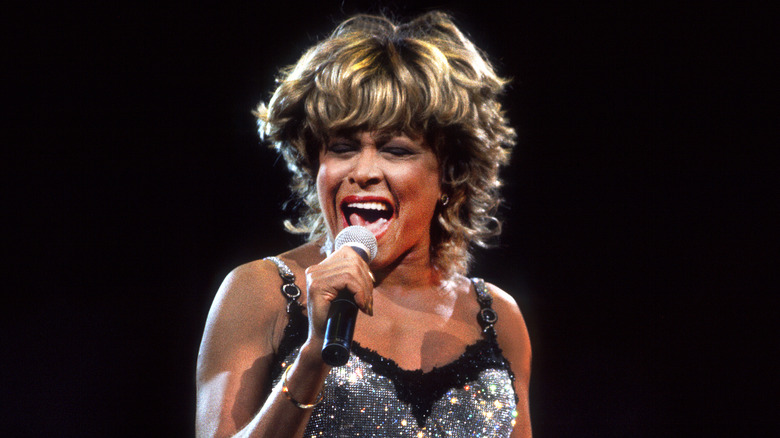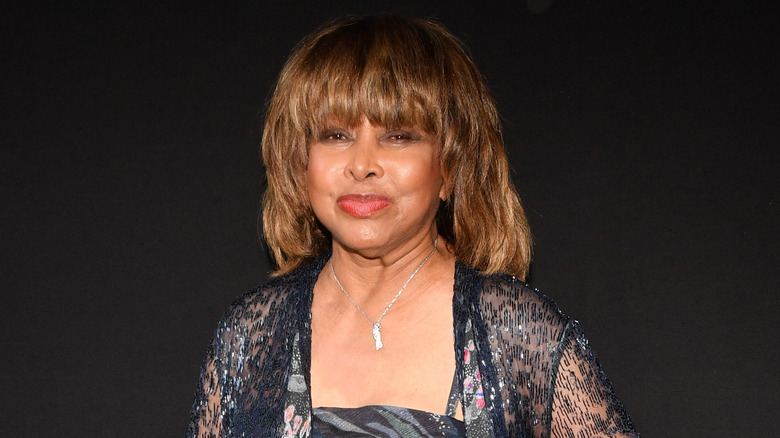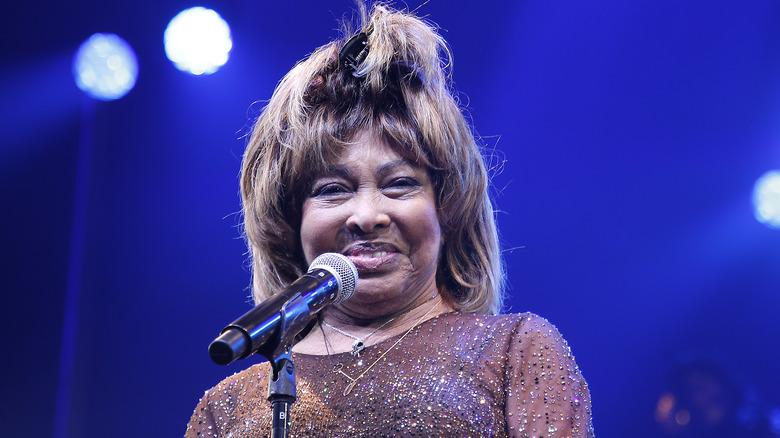The Tragic Life Story Of Tina Turner Is Heartbreaking
The following article includes references to domestic abuse, suicide, and racism.
If one were hard-pressed to pick a song from Tina Turner's hit catalog that most aptly chronicled her life, the titular metaphors of "River Deep — Mountain High" would rank highly on that list. It underscores the peaks and valleys of this Tennessee chanteuse, from her humble childhood picking cotton to becoming one of the most successful female singers in the biz. Credit that whiskey-soaked voice for animating classic tunes from "Proud Mary" to "Private Dancer" and captivating listeners by expressing pain one moment and empowerment the next. While some viewers may have treated Turner's trademark, stiletto-rooted skyscraper gams as eye candy, let's not forget that those same legs whisked her from an abusive marriage to a life of uncertainty that would eventually reward her with freedom and success.
A rigid work ethic hammered into her since childhood and the hardships she faced during those precarious days of the Ike & Tina Turner Revue also toughened Turner considerably. When she discovered that U.S. audiences treated her like a retro novelty, she headed to a more appreciative scene in England to engineer her comeback. The results speak for themselves, with Turner being rewarded with sales of more than 150 million records, 12 Grammy Awards, and a personal fortune estimated at $250 million.
After years in the dumps marked by a great deal of tragedy, Tina Turner's resurgence stands as one of the greatest recoveries of a pop star in history, a testament to a determined individual empowered by the need to move forward.
Her family treated her like an unwanted child
The youngest of three children, Tina Turner first entered the world as Anna Mae Bullock on November 26, 1939 in Brownsville, Tennessee. Her father, Floyd Richard Bullock, had stable employment working for a sharecropper and was their hometown church's deacon. But life at home was hardly idyllic, with Floyd frequently fighting with his strong-willed wife, Zelma Priscilla. The toxicity didn't do much for Anna, who was reportedly treated like the result of a failed marriage. Zelma left for good when Anna was just 10, and Floyd later cultivated a new romantic relationship, eventually leaving the household and the children to be cared for by their Aunt Georgie.
"It was just a fact that my parents didn't care that much for me," Turner told Rolling Stone in 1986. "See, my mother didn't want me in the first place. She had taken my father away from another girl — which is instant karma right there. She was in the process of leaving my father when she got pregnant with me."
Meanwhile, young Anna developed an aptitude for singing, something she enjoyed in church and music class in high school. "I did love singing and dancing as a child, and everyone told me how much they enjoyed hearing me sing," Turner said to the Harvard Business Review in 2021. "But I never thought much of becoming a professional singer until I was older." That would change when her aunt died, prompting the kids to be moved to a cousin's place.
Tina Turner lost a sister and cousin during her teens
At 13, Anna Mae Bullock, the woman who would eventually evolve into Tina Turner, found herself abandoned by both of her parents, leaving her, sister Alline Bullock, and half-sister Evelyn Juanita Currie under the care of their cousin, Ella Vera. According to Mark Bego's biography "Tina Turner: Break Every Rule," Anna was close to Alline, yet had a far more distant relationship with Evelyn — the oldest of the three, who apparently preferred hanging with adults than her younger siblings. Still, when she received the news that Evelyn and her cousin, Margaret Evans — with whom she heavily bonded after her relocation — had died in a car accident, Anna apparently fainted. Later viewing their bodies, she came to grips with the insensitivity of death. "The funeral home had them both there together, and Evelyn didn't even look like herself," wrote Turner in her "I, Tina: My Life Story" autobiography. "Her skull, her whole face, was crushed in, just about smashed flat; but her hair was the same — it was so strange."
Inexplicably, aside from a few paragraphs in her tome, Turner rarely, if ever, publicly mentioned the existence of her half-sister once her singing career caught fire. But she's spoken volumes about Alline, who eventually enjoyed a stable songwriting career, and who dressed Anna up one night to sneak her underage sister into a St. Louis nightclub to catch a popular local act called Ike Turner and the Kings of Rhythm, whose bandleader would change her life.
The singer experienced racism for much of her life
Growing up in Tennessee while still known as Anna, Tina Turner recalled experiencing instances of racism, including having to go through rear entrances of local businesses, while her white counterparts could access the same establishment from the street. "It hurts to be a minority," she said to Rolling Stone in 1986. "I am looked down upon because I'm Black. It's forever. It's like a curse on you." Racism continued to dog her in her professional life, after hooking up with Ike Turner's band. "After the Civil Rights bill passed [in 1964], the Holiday Inns were open to Blacks, and then that was at least made it convenient for traveling," Tina once related to the BBC. "But before that, there was a lot of sleeping on buses, sleeping in cars and sort of parking, you know, and just really roughing it."
That discrimination also affected Tina when it came to radio airplay. "I hate to talk about racism, but that has a lot to do with it," she said to Billboard in 1984. "When I started my career, you had to hit R&B before you could make the crossover." Writer Katori Hall, who contributed to the book of Broadway's "Tina: The Tina Turner Musical," recounted one ugly exchange the singer had with a U.S. label bigwig. "A Capitol executive there called her an N-word douchebag and did not want to put her work out," she said to PBS News Hour, "this phenomenal voice that is a voice of a generation."
The father of Tina Turner's first child left her
In 1957, just before Anna Mae Bullock would morph into Tina Turner, she first saw guitarist Ike Turner perform onstage and was impressed with his musicianship. "I was never attracted to him, but I wanted to sing with his band," said Tina to Oprah Winfrey in 2005. Anna, still a high school senior, was more into dating the band's saxophonist, Raymond Hill, who eventually impregnated her. But he never stuck around to help the future star through motherhood after suffering an ankle injury that forced him to leave the band for home to his family in Clarksville, Tennessee. Tina's own family had to step in. "Well, I went to a city hospital for unwed mothers, so there wasn't a hospital bill," she said to Rolling Stone. "My mother and sister supported us for a while, so I was taken care of in my early stages."
When still with Hill, Anna anticipated the two would marry, but those hopes were quickly dashed, much like an earlier love named Harry Taylor, who had previously taken her virginity. But her love for him quickly dissipated when she found out he was also seeing others. It didn't take long for Anna to get past those ill-fated romances, when a single she recorded with Ike called "A Fool in Love" was rising in the charts, not only propelling them to greater fame, but pushing her closer to the charismatic bandleader.
She was repeatedly abused by her first husband
It was with tragic irony that Anna Mae Bullock, now christened Tina Turner by Ike Turner — whom she married in 1962 — would taste success at the cost of humiliation and abuse at the hand of her bandleading husband. The wedding was a rush job in Tijuana, reportedly to ward off his last wife trying to get a piece of his estate. "As far as I'm concerned, I've never been married," Tina said to Vanity Fair in 1993. "This woman was asking for money, so Ike felt he'd better marry me, so she couldn't get property."
During the '60s, the Ike & Tina Turner Revue caught fire, churning out hits like "Proud Mary" and "River Deep — Mountain High," with critics eventually dubbing the female vocalist as the Queen of Rock and Roll. But she didn't get any royal treatment from Ike, who allegedly engaged in philandering every chance he got, while physically and mentally abusing Tina repeatedly, sometimes just before a show. "I think my nose was broken because blood was gushing into my mouth when I sang," she recalled of one incident to Oprah Winfrey. "Before, I'd been able to hide under makeup. But you can't hide swelling."
While Tina said she'd try to leave on occasion, Ike would still catch her, often punishing her with a coat hanger or worse. "He had a gun at the time," Tina recounted to Rolling Stone. "He always made me feel that at any moment he might put it to my head."
If you or someone you know is dealing with domestic abuse, you can call the National Domestic Violence Hotline at 1−800−799−7233. You can also find more information, resources, and support at their website.
Tina Turner attempted suicide
Life with Ike Turner, whose personality could reportedy turn violent depending on the amount of cocaine he ingested, was a living hell for Tina Turner, who tried to end her life on one occasion. One night in 1968, she discovered her first husband was having sex with two other women who also lived in their house. Weirdly, they were also named Ann, including one already pregnant with his child. Tina took, by her count, 50 sleeping pills, which wound up with her stomach being pumped in a hospital emergency ward. "I knew my suicide attempt hadn't been a classic cry for help: I'd chosen death," Tina recalled in her 2018 memoir "My Love Story" (via the National Post). "Yet I never tried killing myself again, because I came out of the darkness believing that I was meant to survive. I was here for a reason."
In 2016, officially retired and leading a far more affluent life in Switzerland, Tina found herself suffering from excruciating pain when her kidneys were failing. Facing a great deal of agony, she even considered an option that would guarantee permanent relief when she entered an assisted suicide program that year, but the star didn't follow through when her second husband, Erwin Bach, offered one of his kidneys to save her life. "I think that's when the idea of my death became a reality for Erwin," Tina stated in her autobiography (via the Daily Mail). "He was very emotional about not wanting to lose me, not wanting me to leave."
If you or anyone you know is having suicidal thoughts, please call the National Suicide Prevention Lifeline by dialing 988 or by calling 1-800-273-TALK (8255).
A perilous split from Ike Turner left her destitute
While on tour in Dallas in 1976, Tina Turner left Ike Turner with only a Mobil credit card and 36 cents in her purse and sought refuge in a nearby motel, promising to pay the manager at a later date. "I was living a life of death," she said to People in 1981. "I didn't exist. I didn't fear him killing me when I left, because I was already dead. When I walked out, I didn't look back." When she filed for divorce, all she desired was her stage name (which Ike had copyrighted) and her freedom. Tina was still in debt, liable for failing to honor engagements booked by her husband before she left. She chipped away at what she owed with club appearances on the nostalgia circuit, cameos on televised variety shows, and even accepted an invitation to tour with the Rolling Stones.
But the person she credited most was David Bowie, who after signing a deal with Capitol Records in 1983, had executives tag along to see one of the rock superstar's favorite performers. It turned out to be Tina Turner, who put on a spectacular show, and whose contract with Capitol was lapsing. "It was because of David that I got another deal, and everything else followed," she once said (via Female First). "I'll be ever thankful to him." In 1984, Tina released "Private Dancer," which has since sold upwards of 12 million copies internationally. Tina Turner would never go hungry again.
If you or someone you know is dealing with domestic abuse, you can call the National Domestic Violence Hotline at 1−800−799−7233. You can also find more information, resources, and support at their website.
Some of the star's children claim she abandoned them
When Tina Turner left her first husband, she ensured her four boys — Craig (whom she had with saxophonist Raymond Hill); Ronnie (with Ike Turner); and Ike Jr. and Michael (from Ike's previous marriage, and whom she adopted) — would be looked after by a housekeeper. "I made sure they would be all right," Tina told Oprah Winfrey. "But before you can really help them, you have to strengthen yourself. You're the priority."
But a few of her children believed their famous mother continued to look out for No. 1 after her successful comeback. "My mother is living her life — she has a new husband, and she's in Europe," said Ike Jr. to the Daily Mail in 2018, alleging, "She doesn't want to have anything to do with the past." After HBO Max premiered the 2021 documentary "Tina," one source close to one of the sons told Fox News he was supposedly disappointed none of the children received much exposure in the outing. "It was very sad that Ronnie was not interviewed, and not shown playing with his mother," said the insider. "Viewers don't see any of that. Just him as a baby but nothing of him right now as a musician."
Tragically, Craig died by suicide in 2018, prompting Tina to remark to the BBC, "I have no idea what pulled him down, except something that followed him with loneliness." Meanwhile, Ronnie died from complications associated with colon cancer in 2022, six months before his mother passed on.
If you or anyone you know is having suicidal thoughts, please call the National Suicide Prevention Lifeline by dialing 988 or by calling 1-800-273-TALK (8255).
Tina Turner had extensive health issues
By 2000, Tina Turner had conquered every challenge that a female vocalist could seemingly ever face and hung up the mic for a quiet life in Switzerland with boyfriend — and eventual husband — Erwin Bach. No one argued that retirement was well-deserved, considering the hard life she'd led until tasting solo success. However, Turner's physiology unfortunately had other ideas. Her health started declining when she suffered strokes in 2009 and 2013, and her kidneys were starting to fail, traceable to a hypertension diagnosis she received as far back as 1978. "I can't remember ever getting an explanation about what high blood pressure means or how it affects the body," she once explained to the European Health Kidney Alliance. "I considered high blood pressure my normal. Hence, I didn't really try to control it."
What Turner needed was a kidney transplant, which was delayed when she was diagnosed with intestinal cancer in 2016. Doctors managed to remove the cancerous tissue but couldn't deal with Turner's kidneys until her gastrointestinal system had healed first. When both of Turner's kidneys were on the verge of failing, Bach willingly donated one of his in 2017, as previously mentioned. "Erwin chimed in, very emotional, and said, 'I don't want another partner,'" Turner told Oprah Winfrey in 2018. "He was 150 percent ready to give me his kidney."
Turner hung in there for six more years until her death at age 83 on May 24, 2023 from natural causes — an arguably ironic pronouncement for someone whose life was anything but natural.

